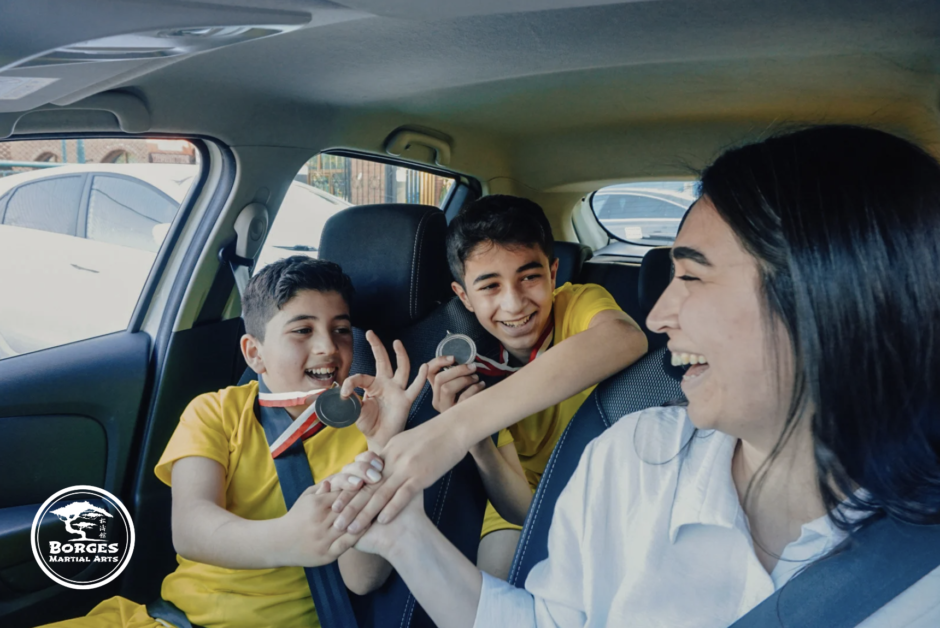Kids Quit on the Drive Home: How to Make the Car Ride Home a More Positive Experience

Parents of even the biggest sport-loving, happy-natured kids know what it’s like to look in the rearview mirror and see a moody, pouting child or teenager in the backseat. Whether they strike out at the plate, didn’t medal at a tournament, or just overall performed poorly, it can make the drive home from a game or practice a rather unpleasant experience for all parties involved. On the other hand, a young athlete may be thrilled to have succeeded or won at something, only to get in the car with their parents to receive a laundry list of things they still did wrong.
As parents, you all want to support your children in their activities and help them grow into confident, resilient individuals. One crucial but often overlooked aspect of this support happens not even during the event itself, but during the car ride home. SKILLZ Worldwide founder and Child Development Expert Melody Johnson speaks on this idea across her many presentations, blogs and podcast appearances, and works with parents and coaches on this exact subject. As a SKILLZ school ourselves, it’s in our interest to help both our parents and our students have more positive and productive experiences not just in martial arts, but across all sports and activities.
How we speak to children in those moments can significantly impact their enthusiasm and long-term dedication to the sport. In fact, many kids and teens quit on the drive home due to how their performance, behavior, or efforts are received by the adults in their lives. Here’s how you can use that time on the road to speak positively about what they did well and address any failures or negative behaviors in a more constructive way later.
Focus on the Positives
- Celebrate Effort and Progress: The drive home is the perfect time to highlight your child’s efforts and any progress they made. Whether they nailed a new technique, showed good sportsmanship, or simply put in a solid effort, let them know you noticed. Positive reinforcement encourages them to keep trying and enjoy the learning process.
- Highlight Specific Achievements: Instead of generic praise, be specific about what they did well. Saying “I loved how determined you were during sparring today,” or “You showed excellent respect to the refs today,” makes your praise more meaningful and impactful.
- Express Genuine Interest: Ask open-ended questions about what they enjoyed the most. This not only shows that you care about their experience, but also helps them reflect on the positives. Questions like “What was your favorite part of today’s practice?” or “What new thing did you learn today?” can spark enthusiastic conversations.
Address Failures and Negative Behaviors at a Later Time
- Give It Time: If there were any failures or struggles in class, at practice, or during a game, or if negative behavior was displayed, avoid addressing it immediately on the drive home. When emotions are still high, criticism may feel more intense and discouraging. Give your child some time to decompress and process their own emotions. This is not to say that if an egregious behavior or meltdown takes place you ignore it (it should be quickly and quietly nipped in the bud), but rather that the learning process about what they could do better next time can take place at a more productive time. Once they’ve cooled down, approach them calmly and discuss what happened, how they could perform or react differently in the future, and what the expectations for behavior are both from a parenting standpoint and a sports standpoint. Approach the conversation with empathy and a focus on growth. Use language that encourages learning rather than assigning blame.
- Constructive Feedback: When discussing areas for improvement, frame your feedback in a constructive way. Instead of saying, “You didn’t play your best at soccer today,” try “What do you think we can work on to make the next game better?” This encourages a growth mindset and helps your child see challenges as opportunities for improvement. Additionally, prompting them to problem solve rather than telling them what needs to be corrected allows the child to cultivate their own intrinsic motivation, original thought, and self-evaluation.
- Coaches Are a Resource: Technical feedback can’t always come from mom and dad. If your child is in a sport that you’re relatively unfamiliar with, a child may push back against your feedback, as they feel you don’t have the proper knowledge. At the same time, a parent with experience in a sport may provide excessive feedback and make their child feel inferior to their skill level. Instead, try using the coaches as a resource! A simple “Why don’t we get to practice a few minutes earlier than usual to ask Coach for some help with dribbling?” can go a long way, and reduce friction between you and your children.
Building a Positive Routine
- Consistency Is Key: Make positive reinforcement a regular part of your routine. Consistent encouragement helps build your child’s confidence and reinforces their love for sports. Over time, this positivity becomes associated with their training experience, making them more likely to stick with it.
- Model Positivity: Children often mirror their parents’ attitudes and behaviors. Show enthusiasm and a positive attitude towards their practice. If you model resilience and optimism, your child is more likely to adopt the same mindset. If you chronically complain to coaches, blame refs, judges or umpires, or speak negatively about their opponents, this will soon be reflected in your child’s mindset as well.
- Encourage Self-Reflection: Teach your athlete to self-reflect by asking them what they think they did well and what they want to work on. This helps them take ownership and accountability of the learning process and helps them develop self-awareness. It also fosters a sense of responsibility and independence in their endeavors.
The drive home from any practice, class, game, or tournament is a valuable opportunity to reinforce your child’s positive experiences and handle setbacks with care. By focusing on what they did well and saving constructive feedback for a calmer moment, you help build their confidence and resilience. Remember, kids quit on the drive home when they feel discouraged, embarrassed, or criticized. By using this time to celebrate their efforts and progress, you can help them develop a lifelong love for sports, martial arts, and all of their activities.
As parents, your words and actions play a crucial role in shaping our children’s experiences and attitudes. Let’s use the drive home to build them up, encourage their growth, and keep them excited about their athletic journeys!
